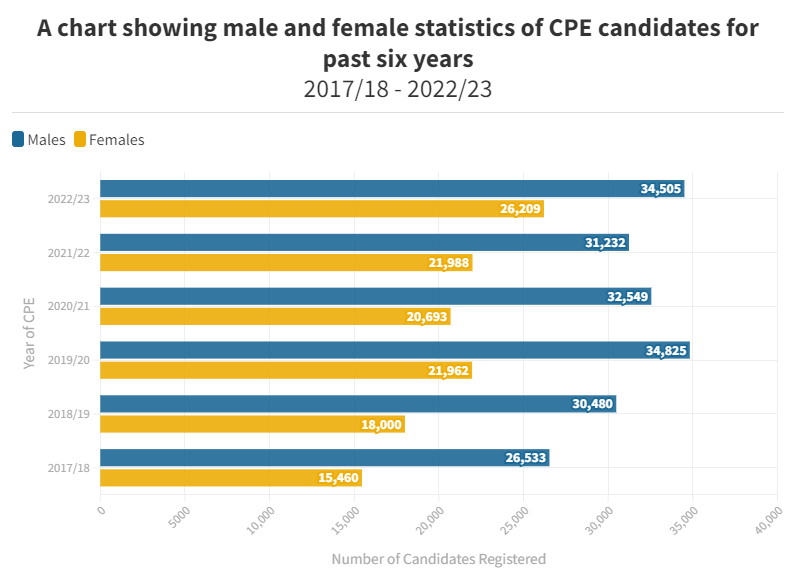Data Story: 12.34% rise in the number of pupils registered for the certificate of primary education examinations this year.
The previous year, 53,220 enrolled for the exams comprising 31,232 males and 21,988 females. This year, 60,714 candidates, 34,505 males and 26,209 females, registered.
Writer: Emmanuel Bida Thomas
This week, pupils across South Sudan will write their Certificate of Primary Education (CPE) examinations for the academic year 2022.
The Ministry of General Education and Instruction says that a total of 60,714 candidates, 34,505 males and 26,209 females, have dully registered for the examination, which began on Monday, February 13, 2023.
However, as compared to the previous year, when 53,220 candidates, including 31,232 males and 21,988 females, registered, this year’s number shows a 12.34 per cent increase in the number of candidates.
Male candidates increased by 3,273 from 31,232 in the 2021/22 exams, and female candidates also grew by 4,221 from 21,988 the previous year.
The increase in male candidates accounts for 9.49% of the increase, while the increase in female candidates accounts for 16.11% of the increase.
| Year | Males | Females | Total |
| 2017/18 | 26,533 | 15,460 | 41,993 |
| 2018/19 | 30,480 | 18,000 | 48,480 |
| 2019/20 | 34,825 | 21,962 | 56,787 |
| 2020/21 | 32,549 | 20,693 | 62,362 |
| 2021/22 | 31,232 | 21,988 | 53,220 |
| 2022/23 | 34,505 | 26,209 | 60,714 |
Table showing statistics of CPE candidates for the past six years
The presented data indicates that there has been a 12.34% increase in the number of candidates registered for the Certificate of Primary Education (CPE) examinations in South Sudan for the academic year 2022, in comparison to the previous year. Out of a total of 60,714 registered candidates, 34,505 are male, and 26,209 are female. Notably, the percentage increase in male candidates stands at 9.49%, while that of female candidates is 16.11%. The South Sudan National Examinations Council (SSNEC) has demonstrated exceptional efforts in registering a significant number of candidates this year, notwithstanding challenges such as insecurity and feeding difficulties in some regions of the country, as noted by the Minister for General Education and Instruction, Awut Deng Acuil.



